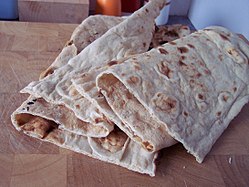Fugazza
 Fugazza con queso | |
| Type | Flatbread |
|---|---|
| Place of origin | Argentina |
| Region or state | Buenos Aires |
| Serving temperature | Hot or warm |
| Main ingredients | Dough, onions, cheese |
| Part of a series on |
| Pizza |
|---|
 |

Fugazza (from Genoese: fugassa) is a common type of Argentine pizza, originating in Buenos Aires, that consists of a thick pizza crust topped with onions and sometimes olives. A similar variant known as fugazza con queso or fugazzetta includes cheese along with the aforementioned ingredients.[1] It is derived from a combination of Neapolitan pizza with Italian focaccia bread.
Fugazza and its variations are believed to have been invented sometime between 1893 and 1932 by a Genoese-Argentine pizza maker named Juan Banchero, who served it out of a pizza shop bearing his name. Banchero's pizza shop continues to sell fugazza to this day in the Buenos Aires neighborhood of La Boca, which historically served as a home to Genoese immigrants to Argentina.[2]
Characteristics and varieties
[edit]Fugazza is typically prepared with the following ingredients:[3]
- Argentine pizza dough ("masa"—meaning at least three focaccia-like centimetres when served, or the more moderate "half-dough"—"media masa"), characterized by a spongy consistency, and far more water and leavening than a Neapolitan pizza crust
- low-moisture cow's milk mozzarella
- red onions
- green onion
- sweet onions
- oregano
- Parmesan cheese
- olive oil
Fugazzetta is a variation on fugazza in which the cheese is baked in between two pizza crusts (usually media masa), and the onions are placed on top.[4]
Figazza is a version of fugazza from Uruguay, where the main difference is the lack of cheese or any middle filling, also the portions are cut to the style of Uruguayan pizza, which is in rectangular pieces, and it can have additional topping of olives and bell peppers, a less common version of Uruguayan figazza is figazza con muzzarella, where mozzarella cheese is put on top of the onions, almost same ingredients of Argentinian fugazza but backwards order.[5][6]
See also
[edit]References
[edit]- ^ "PIZZA FUGAZZA CON QUESO – PIZZA ARGENTINA". Cómeme la pizza. 2 July 2014.
- ^ "Los inventores de la fugazza con queso". Clarín. 12 February 2006.
- ^ "PIZZA FUGAZZA CON QUESO – PIZZA ARGENTINA". 2 July 2014.
- ^ "Fugazza vs. fugazzeta" (in Spanish). Retrieved 2022-06-08.
- ^ "Pizza y Fainá". 29 November 2020.
- ^ Rojas, Gustavo Fripp (15 April 2020). ¿Qué es boniato, maestro? Pequeño diccionario ilustrado de uruguayismos para porteños: Contiene como chiquicientas definiciones. Alter ediciones. ISBN 9789974872370.

